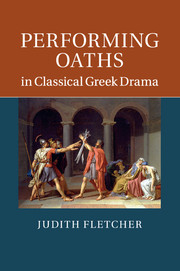Book contents
- Frontmatter
- Contents
- Acknowledgments
- A note on abbreviations
- Introduction
- Chapter 1 From curses to blessings: horkos in the Oresteia
- Chapter 2 Speaking like a man: oaths in Sophocles’ Trachiniae and Philoctetes
- Chapter 3 Horkos in the polis: Athens, Thebes and Sophocles
- Chapter 4 Perjury and other perversions: Euripides’ Phoenissae, Orestes and Cyclops
- Chapter 5 Twisted justice in Aristophanes’ Clouds
- Chapter 6 Women and oaths in Euripides
- Chapter 7 How to do things with Euripides: Aristophanes’ Thesmophoriazusae
- Chapter 8 Swearing off sex: the women's oath in Aristophanes’ Lysistrata
- Conclusion
- Bibliography
- Index locorum
- General index
Chapter 6 - Women and oaths in Euripides
Published online by Cambridge University Press: 05 December 2011
- Frontmatter
- Contents
- Acknowledgments
- A note on abbreviations
- Introduction
- Chapter 1 From curses to blessings: horkos in the Oresteia
- Chapter 2 Speaking like a man: oaths in Sophocles’ Trachiniae and Philoctetes
- Chapter 3 Horkos in the polis: Athens, Thebes and Sophocles
- Chapter 4 Perjury and other perversions: Euripides’ Phoenissae, Orestes and Cyclops
- Chapter 5 Twisted justice in Aristophanes’ Clouds
- Chapter 6 Women and oaths in Euripides
- Chapter 7 How to do things with Euripides: Aristophanes’ Thesmophoriazusae
- Chapter 8 Swearing off sex: the women's oath in Aristophanes’ Lysistrata
- Conclusion
- Bibliography
- Index locorum
- General index
Summary
Oaths can bestow agency to those who swear them as much as to those who demand them. Athenian drama makes the most of their potency, using them to shape a plot, mark its conclusion and confer status. Their ability to generate a story, as I have theorized, is analogous to the productive capacity of male fertility contained within oaths’ blessings or, more commonly, threatened by their curses. Not surprisingly most of the oaths in Greek drama are sworn by men to other men, demonstrating how even the depiction of a mythical past can reflect Athenian social practices in which public discourse was largely a male domain. Oaths by one male to another are the most positive manifestations of horkos in Greek tragedy. Even the abject Hippolytus creates a bond with his father when his oath absolves Theseus of blood-guilt. On the other hand Hippolytus was doomed once he swore his oath of secrecy to the Nurse. As a consequence of his incautious speech act he never participates in public discourse. There is a palpable contrast between the oath sworn by a man to a woman, a slave woman at that, and the constructive oaths sworn between men in other tragedies: Neoptolemus to Philoctetes, for example. This chapter returns to Hippolytus and examines it along with Euripides’ Medea and Iphigenia in Tauris, tragedies that also feature men swearing oaths to women. The relationship between performative language and plot is similar in all plays, but the Iphigenia offers a solution to the disturbing scenario of female-authored oaths, perhaps because it is a different kind of tragedy.
At the root of the uneasiness underlying women's control of oaths is the issue of gender and agency. We have already noted how the Agamemnon treated the oaths of Clytemnestra as a perversion of sorts. The Oresteia also represents female characters’ failures to elicit oaths from men: Cassandra from the Chorus of Elders, the Erinyes from Orestes. An oath, especially a promissory oath, will give a woman power over a man – a disturbance of the male hegemony – and the Oresteia cautiously avoids this scenario. Lovers’ oaths aside (which seem to be a special category), literary examples of men swearing to women often thematize a threat to the continuation of the patriarchal genos, blighting the “fruitfulness of sperm” (to recall Karavites’ useful description) inherent in oath-blessings. Euripides takes account of the fact that a woman may have no way of getting a man to keep a promise other than compelling him to swear an oath. Hippolytus and Medea develop a relatively common topos in which a woman connives to get control by making a man swear an oath to her. When women get men to swear oaths – to grant sanctuary, keep a secret, or bestow a favor whose terms are not clear – they also invoke the higher authority of the gods who function as guarantors of the oath. This triangulated relationship – man, woman, god – contributes to the increased agency of female protagonists, whose authority is fortified by invoking the gods as witnesses to the oaths. These oaths become powerful dramaturgical devices by which the divine world supports women's machinations, now an inexorable force that propels the tragedy to its reversal.
- Type
- Chapter
- Information
- Performing Oaths in Classical Greek Drama , pp. 177 - 202Publisher: Cambridge University PressPrint publication year: 2011



